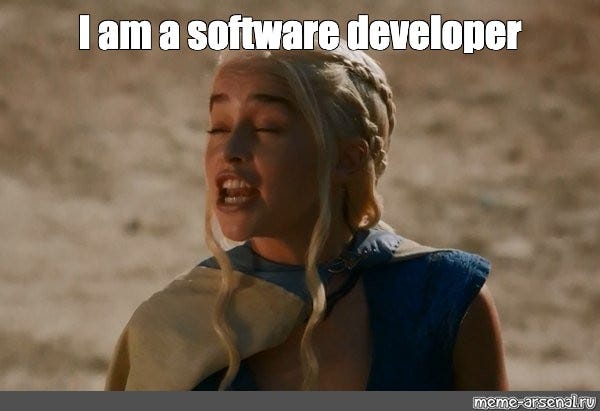Thank you for checking out this latest newsletter from The Product Gist.
If you are reading and find some value here, subscribe and do share it with someone else.
ICYMI: Here is the product wiki. This is a document I curated to help you with your product journey. Do go through it. I would love to hear your feedback!
Finally, I have a product strategy template that you can use to prep for next year and beyond. The template is loosely inspired by Porter’s Value Chain Analysis, Porter’s 5 Forces and Jobs to be Done (JBTDs).
If you are interested, like/share this post and make sure you are subscribed to The Product Gist!
Have you ever worked with a developer who almost made you pull your hair out? Or a developer who made you sleep okay at night knowing all is well?
In our work as product managers, we need to understand the personalities of each developer we work with and dealing with each personality type is just as important as working with the development team to form a collective unit. Your relationship with your developers plays a crucial role in the success of your product.
There are three main Developer Personality Types.
Prima Donna
Prima Donnas are brilliant and insist on arguing about everything to ensure they get to the truth even though they know what truth is for them. They may be exceptional at what they do, but they don’t necessarily know or care about the role of product management in software development.
Coder
Coders have no influential opinions but want instructions on what to build. All that is important to them is getting the specification. They will write code and add any feature you desire. They need you to be clear and specific. If there is a problem, it will be a case of how detailed the specifications were, not how it was translated and written in code.
Team player
Between the coder and the prima donna is the sweet spot called the team player. Team players understand the value of a product manager and want to work with you interactively to build a product that customers love.
How do you cope and work with the different personality types?
You apply a diverse approach to get the desired results from each personality type.
Be less explicit with prima donnas. When you get feedback and bring up a requirement, suggest probable solutions instead of conveying a final solution. Tell them this “Our Customers need to be able to do the following. Here’s one way we can do it, but this is just a thought.” Prima Donnas like to be on the front foot in providing solutions. In cases like this, let the prima donna solve it; in fact, question them to come up with a great solution. Ask prima donnas for their ideas and rationales. A question like “Is this the best way to solve the problem?” can get them fired up and beaming with solutions. In essence, you need to play to their egos.
Your job in working with prima donnas is to make them hungry for information only you can provide about the customers and market. If you can present arguments such that they draw logical conclusions they believe they have come to on their own, you are in a good place.
Be more specific with coders. Tell coders precisely what you need. You could say: “The following feature should be this way. Come back with a solution, and I’ll endorse it.” When they’re creating the solution, Communicate as often as you can
The challenge here is that if you aren’t specific, you may end up with something very different from what you originally conceived. A fantastic approach with coders is to write more specific requirements and then work very closely with coders to implement them, so they don’t get too far down the wrong path.
Be open to creativity from team players. Give team players information about customer needs and pain points, reassure them that they are on track to delivering what you want and allow them to suggest solutions. You will be amazed at the elegance and creativity they display.
So who do you need in your team?
Let’s face it. Everyone would like a team player, but not everyone gets a team player. You might currently have a team of prima donnas and coders. It does not mean they are bad people or hate progress. With this information, you can work with any developer with their personality type in mind when you engage and build rapport with them.
Furthermore, I would like to note that a developer might exhibit these personality types in varied situations. When that happens, identify what personality type is on display and act accordingly.
Interesting Things I Have Found Lately…
Think Learning, Not Experiments
Here are three common PM role antipatterns you should take note of
Jeff Patton delves into the importance of opportunity, output, outcome, and impact, as well as tensions and unexpected implications, for product development
Marty Cagan discusses the foundation of what it means to be a strong product team.
I hope your product journey is progressing well. Please, if you have any questions about product management, you can shoot me an email. I will respond as sooon as I can.
Take care and good luck,
Fumnanya





